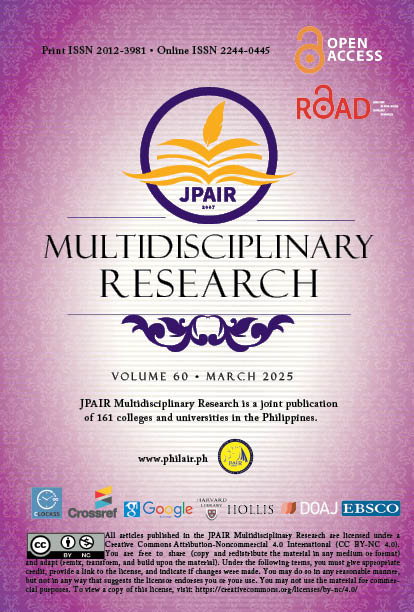Participatory Groups in Urban Flooding: The Case of Mandaue City, Cebu, Philippines
DOI:
https://doi.org/10.7719/jpair.v60i1.935Keywords:
Participatory Groups, Flood, Disaster Risk , Reduction and Management, Butuanon River Watershed, Water Quality Management Area, Mandaue City, Cebu, PhilippinesAbstract
Flooding affects people globally. Flooding leads to the loss of infrastructure, livelihood, essential belongings, and even lives. This study described the participatory groups created in the community for flooding and how men, women, and the LGBTQ community involved themselves in the participatory groups. This study is part of the Research Project "Exploring gendered knowledge and inclusiveness in community resilience for flooding disaster: Case studies in Can Tho City (Vietnam) and Metro Cebu (Philippines) funded by the Asia-Pacific Network for Global Climate Research, Kobe, Japan. A descriptive, exploratory, qualitative research endeavor was used in this study to look into the floods that affected the communities of Village Looc and Village Paknaan in Mandaue City, Cebu, Philippines. Twenty informants, comprising males, females, and LGBTQ community members from each village, participated in Focus Group Discussions (FGDs). All informants had resided in their respective villages for over a decade and possessed direct experience with local flooding events. Data collection involved in-depth interviews during the FGDs, followed by systematic data collation and analysis. The study revealed several key themes regarding community responses to flooding, and the study found that sexual orientation and gender identity expression do not impede one's ability to contribute effectively during crises. These findings underscore the importance of inclusive and well-structured emergency management strategies in mitigating the impact of disasters.
Metrics
Downloads
References
Aldrich, D.P., & Meyer, M.A.(2015). Social capital and community resilience. [doi:10.1177/0002764214550299]. The American Behavioral Scientist, 59(2),254–269.
Bauer, H., Gebresenbet, F., Kiki, M., Simpson, L., & Sillero-Zubiri, C. (2019). Race and gender bias in the research community on African lions. Frontiers in Ecology and Evolution, 7, 24.
Bernados Jr, S. C., Ocampo, L. A., Pilapil, E. A., & Zamora, N. F. (2020). Can the Bonding Social Capital be Used to Mitigate the Impact of Natural Hazards?: The Case of a Flood-Prone Suburban Community in the Philippines. International Journal of Social Ecology and Sustainable Development (IJSESD), 11(3), 26-36.
Published
Issue
Section
License
Copyright (c) 2025 Richie L. Montebon, Mauro Allan P. Amparado, Anna Liza B. Son

This work is licensed under a Creative Commons Attribution-NonCommercial 4.0 International License.
Open Access. This article published by JPAIR Multidisciplinary Research is licensed under a Creative Commons Attribution-Noncommercial 4.0 International (CC BY-NC 4.0). You are free to share (copy and redistribute the material in any medium or format) and adapt (remix, transform, and build upon the material). Under the following terms, you must give appropriate credit, provide a link to the license, and indicate if changes were made. You may do so in any reasonable manner, but not in any way that suggests the licensor endorses you or your use. You may not use the material for commercial purposes.























